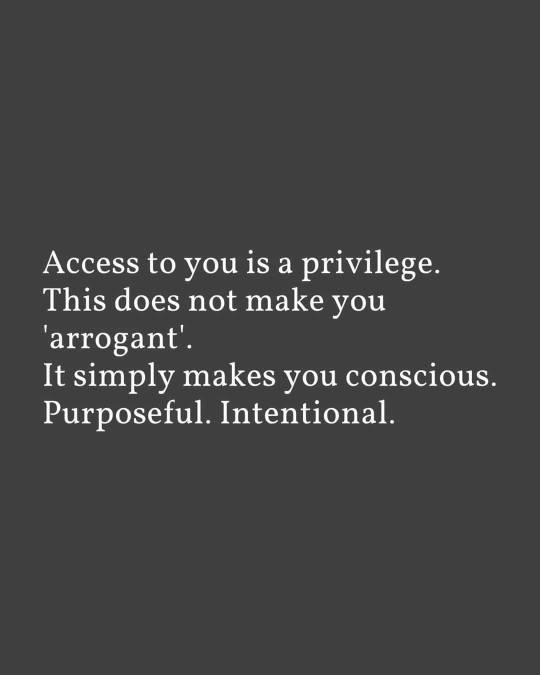#access
Explore tagged Tumblr posts
Text

📚 At JSTOR, we believe in advancing literacy and making knowledge accessible to all. Explore our vast collection of scholarly articles, books, and primary sources in ways that work for you:
Open access: A growing selection of free content available to everyone.
Institutional access: Many universities, colleges, and schools provide JSTOR access for students, faculty, and alumni.
Public library access: Check with your local #Library for JSTOR access and support your lifelong learning journey.
Register & read: Create a free account to read select articles each month.
JPASS: Paid individual access to an expanded library of content.
Learn more about accessing JSTOR.
Image: A Philosopher Reading. Oil Painting. n.d. Wellcome Collection.
258 notes
·
View notes
Text
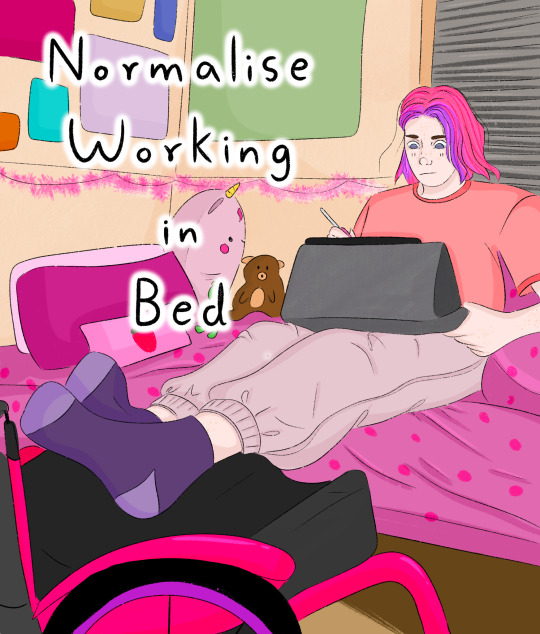
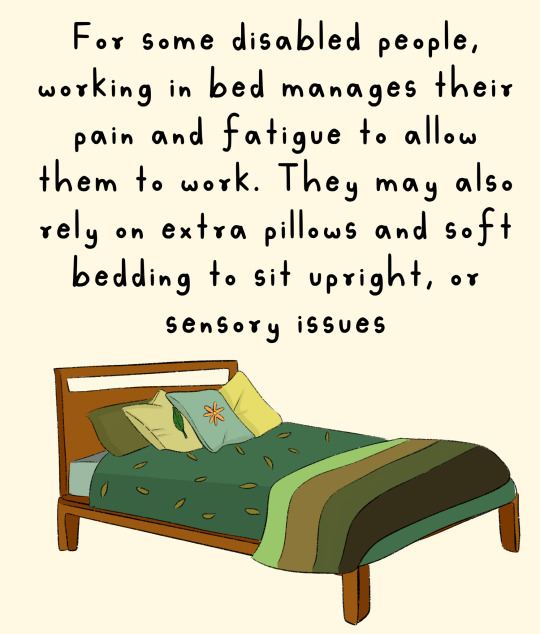
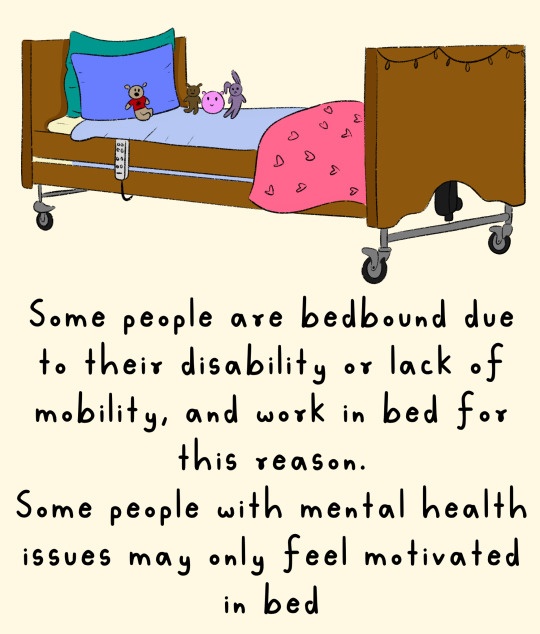
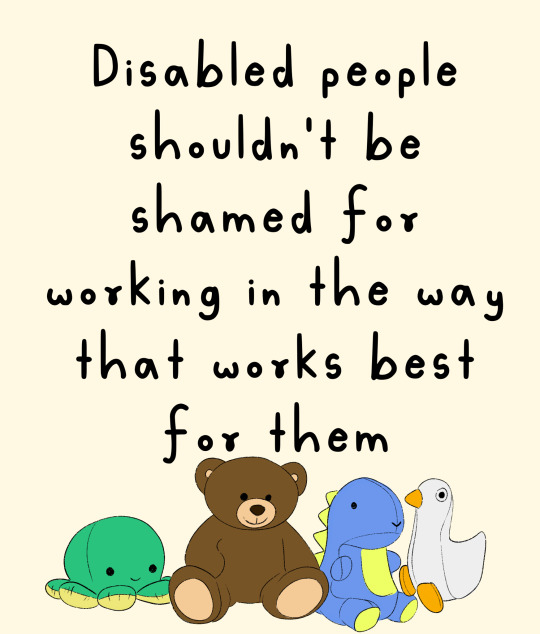
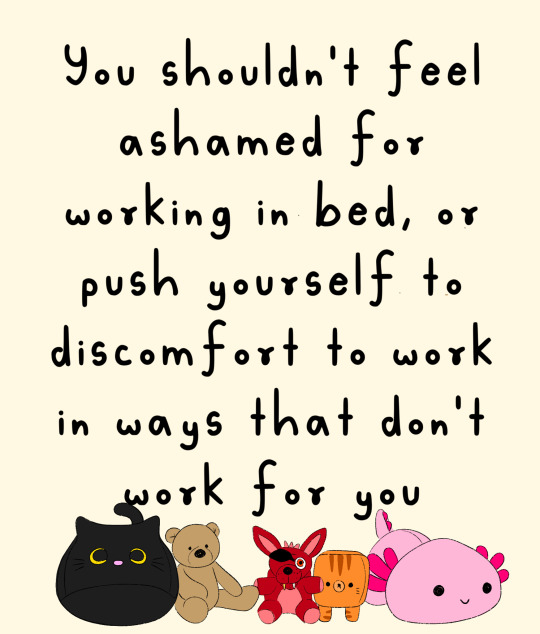

Normalise Working in Bed!!!
A little note for anyone who needs a reminder they're doing what's best for them and that's okay!
ID in Alt.
#art#original art#artist#oc art#original character#queer#disabled#disabled rights#disability#disability pride month#access#id in alt text#accessibility#working in bed#bed#mental health
985 notes
·
View notes
Text
👏Your👏 baby👏in👏that👏foldable👏pram👏does👏not👏belong👏in👏the👏reserved👏wheelchair👏spot👏on👏the👏train👏when👏the👏train👏is👏packed👏and 👏people👏in wheelchairs👏are👏forced👏to👏just👏park👏👏their👏wheelchair👏in👏the👏middle👏of👏👏a👏walkway👏
You can literally fold the pram and hold your child.
Those spots are there so we are safe and out of the way. So we are able to get emergency help if needed via the emergency assistance button. So we don’t slide down the middle of the train or slam into people if it comes to a sudden stop.
I can not just fold my chair and get out of it. I don’t have the privilege or ability to do that. It is not a pram parking spot, the symbol on the floor and walls is not of a pram, it’s of the universal symbol for people with disabilities.
Wild how people will still do this when there is literally a sign stating that you will be fined if you don’t give up the spot. If your baby has mobility, if you have mobility; your pram was literally made to be folded and compacted. Please DO IT when the train is full and people with mobility aids are forced into spots that aren’t safe.
Fuck you. I should not have to be unsafe so you don’t have to fold a pram and hold your child.
#audhd#autism#nd#neurodiversity#neurodivergent#chronic illness#chronically ill#postural orthostatic tachycardia syndrome#pots#wheelchair#wheelchair user#accessible#access#accessibility#disabled#disability#public transportation#public transit#melbourne trains#train#accessibility issues#manual wheelchair#mobility aid
148 notes
·
View notes
Text
The deeper you heal, the higher you raise the bar on who gets access to you.
265 notes
·
View notes
Note
Hello, I really wanted to express my personal gratitude to you for having this blog and sharing your voice. For context, I am an able-bodied and intellectually disabled person of color who is of short stature (not a little person). You are the *first* online activist I have encountered who takes seriously the cultural and accessibility issues that come with being short (LP or not), and having related proportions like small hands and short legs. These traits are also very often racialized in my experience as an Asian person, another angle that I have seen no one talk about despite its prominence in my life.
It pains me immensely how normalized it is even among "progressive" circles to mock and shame short stature, and to dismiss the people who vocalize being hurt. It reminds me of how my disability is treated, even amongst the most otherwise progressive people. The things you say about "physical comedy" strike a chord in me because it is deeply damaging to see my proportions only emphasized as comic relief, and even more damaging to see otherwise inclusive people laugh along. I often feel universally ostracized and belittled; I have been denied the dignity and respect of adulthood due to my race, my disability, and yes, my stature, and very, very few people take me seriously on this issue. Again, you are the first person I have seen online treating this with any measure of dignity. Even though I am not myself a little person, I thank you sincerely for helping me feel seen and for allowing me to discover a community with which I feel solidarity.
Hello!! I'm so glad you've found my blog helpful!! Yes, there are several access and social issues that go beyond simply people with dwarfism, to all people of short stature! We may not have the same history or face the same medical discrimination, but the culture surrounding being short and the world that is built for the average heighted (white man) can be just as debilitating and easily overlooked!
I'm happy to provide this solidarity, especially when it means that blogs like mine can be valuable to a variety of demographics. Little people are a small minority, and face one of the last socially acceptable forms of discrimination - all allies are welcome here.
Elliot (they/them)
67 notes
·
View notes
Text
WHITETAIL GEIGER GAME ACCESS REQUEST
#whitetail#geiger#game#access#request#access request#geiger games#reindeer games#sum games#patriot games#american patriot#microsoft#brad geiger#william bradley pitt#barack hussein obama#william arthur philip louis#sheridan wyoming#united kingdom#great britain#food network#interface#heads up display#basement#heartbeat sensors#terra earth#earth terra#planet#terrafirma#latin language#deanna troi
63 notes
·
View notes
Text

‘Knowledge is power’: new app helps US teens read books banned in school via The Guardian [Shared]
At home, the book helped Saffy feel comfortable and confident with gender expression. But at school, Gender Queer was banned.
For the past two years, book banning has been on the rise in schools and libraries across the US, mainly due to far-right pressure. The bans are pushed either by local actors, like anxious parents and parent-led groups or by politicians through broader state-level laws. A recent PEN America study found that the bans were most prevalent this year in Florida, Texas, Utah, Missouri and South Carolina.
Consistently, these bans target materials written by and about people of color or LGBTQ+ individuals, and even though a 2022 poll found that 70% of parents oppose them, they are continuing at a rapid rate. Now the Digital Public Library of America (DPLA) is trying to fight back. It recently launched the Banned Book Program, granting free nationwide access to books restricted in schools or libraries.
27 notes
·
View notes
Note
Maybe I'm being a snitch to people who have done it and do it on purpose, but it seems wrong not to tell you because it is paid content. You may be aware of this, but just in case you aren't I feel you need to know.
I was previously subscribed to your patreon, Nomad tier, so that I could read Chapter 10. When I did that, I got access to the itch.io version. It shows up as owned content. I unsubbed but it shows that I still own that. That version is still getting updates and I am able to access chapter 11 even though I am no longer subbed, so I'm sure others are able to do the same.
Thanks for bringing this to my attention and for being honest. I've taken steps to prevent this from happening. Accessing the game demo has always been a challenge with piracy and of course through itch.io so I appreciate you telling me.
31 notes
·
View notes
Text
The (open) web is good, actually
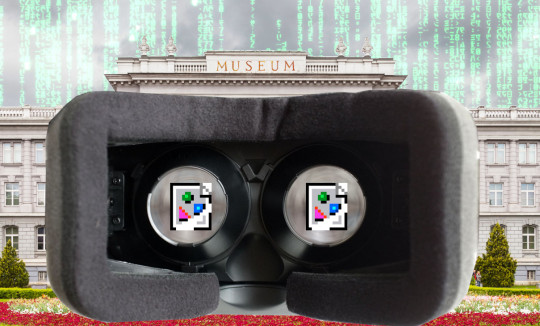
I'll be at the Studio City branch of the LA Public Library tonight (Monday, November 13) at 1830hPT to launch my new novel, The Lost Cause. There'll be a reading, a talk, a surprise guest (!!) and a signing, with books on sale. Tell your friends! Come on down!

The great irony of the platformization of the internet is that platforms are intermediaries, and the original promise of the internet that got so many of us excited about it was disintermediation – getting rid of the middlemen that act as gatekeepers between community members, creators and audiences, buyers and sellers, etc.
The platformized internet is ripe for rent seeking: where the platform captures an ever-larger share of the value generated by its users, making the service worst for both, while lock-in stops people from looking elsewhere. Every sector of the modern economy is less competitive, thanks to monopolistic tactics like mergers and acquisitions and predatory pricing. But with tech, the options for making things worse are infinitely divisible, thanks to the flexibility of digital systems, which means that product managers can keep subdividing the Jenga blocks they pulling out of the services we rely on. Combine platforms with monopolies with digital flexibility and you get enshittification:
https://pluralistic.net/2023/01/21/potemkin-ai/#hey-guys
An enshittified, platformized internet is bad for lots of reasons – it concentrates decisions about who may speak and what may be said into just a few hands; it creates a rich-get-richer dynamic that creates a new oligarchy, with all the corruption and instability that comes with elite capture; it makes life materially worse for workers, users, and communities.
But there are many other ways in which the enshitternet is worse than the old good internet. Today, I want to talk about how the enshitternet affects openness and all that entails. An open internet is one whose workings are transparent (think of "open source"), but it's also an internet founded on access – the ability to know what has gone before, to recall what has been said, and to revisit the context in which it was said.
At last week's Museum Computer Network conference, Aaron Straup Cope gave a talk on museums and technology called "Wishful Thinking – A critical discussion of 'extended reality' technologies in the cultural heritage sector" that beautifully addressed these questions of recall and revisiting:
https://www.aaronland.info/weblog/2023/11/11/therapy/#wishful
Cope is a museums technologist who's worked on lots of critical digital projects over the years, and in this talk, he addresses himself to the difference between the excitement of the galleries, libraries, archives and museums (GLAM) sector over the possibilities of the web, and why he doesn't feel the same excitement over the metaverse, and its various guises – XR, VR, MR and AR.
The biggest reason to be excited about the web was – and is – the openness of disintermediation. The internet was inspired by the end-to-end principle, the idea that the network's first duty was to transmit data from willing senders to willing receivers, as efficiently and reliably as possible. That principle made it possible for whole swathes of people to connect with one another. As Cope writes, openness "was not, and has never been, a guarantee of a receptive audience or even any audience at all." But because it was "easy and cheap enough to put something on the web," you could "leave it there long enough for others to find it."
That dynamic nurtured an environment where people could have "time to warm up to ideas." This is in sharp contrast to the social media world, where "[anything] not immediately successful or viral … was a waste of time and effort… not worth doing." The social media bias towards a river of content that can't be easily reversed is one in which the only ideas that get to spread are those the algorithm boosts.
This is an important way to understand the role of algorithms in the context of the spread of ideas – that without recall or revisiting, we just don't see stuff, including stuff that might challenge our thinking and change our minds. This is a much more materialistic and grounded way to talk about algorithms and ideas than the idea that Big Data and AI make algorithms so persuasive that they can control our minds:
https://pluralistic.net/2023/11/06/attention-rents/#consumer-welfare-queens
As bad as this is in the social media context, it's even worse in the context of apps, which can't be linked into, bookmarked, or archived. All of this made apps an ominous sign right from the beginning:
https://memex.craphound.com/2010/04/01/why-i-wont-buy-an-ipad-and-think-you-shouldnt-either/
Apps interact with law in precisely the way that web-pages don't. "An app is just a web-page wrapped in enough IP to make it a crime to defend yourself against corporate predation":
https://pluralistic.net/2023/08/27/an-audacious-plan-to-halt-the-internets-enshittification-and-throw-it-into-reverse/
Apps are "closed" in every sense. You can't see what's on an app without installing the app and "agreeing" to its terms of service. You can't reverse-engineer an app (to add a privacy blocker, or to change how it presents information) without risking criminal and civil liability. You can't bookmark anything the app won't let you bookmark, and you can't preserve anything the app won't let you preserve.
Despite being built on the same underlying open frameworks – HTTP, HTML, etc – as the web, apps have the opposite technological viewpoint to the web. Apps' technopolitics are at war with the web's technopolitics. The web is built around recall – the ability to see things, go back to things, save things. The web has the technopolitics of a museum:
https://www.aaronland.info/weblog/2014/09/11/brand/#dconstruct
By comparison, apps have the politics of a product, and most often, that product is a rent-seeking, lock-in-hunting product that wants to take you hostage by holding something you love hostage – your data, perhaps, or your friends:
https://www.eff.org/deeplinks/2021/08/facebooks-secret-war-switching-costs
When Anil Dash described "The Web We Lost" in 2012, he was describing a web with the technopolitics of a museum:
where tagging was combined with permissive licenses to make it easy for people to find and reuse each others' stuff;
where it was easy to find out who linked to you in realtime even though most of us were posting to our own sites, which they controlled;
where a link from one site to another meant one person found another person's contribution worthy;
where privacy-invasive bids to capture the web were greeted with outright hostility;
where every service that helped you post things that mattered to you was expected to make it easy for you take that data back if you changed services;
where inlining or referencing material from someone else's site meant following a technical standard, not inking a business-development deal;
https://www.anildash.com/2012/12/13/the_web_we_lost/
Ten years later, Dash's "broken tech/content culture cycle" described the web we live on now:
https://www.anildash.com/2022/02/09/the-stupid-tech-content-culture-cycle/
found your platform by promising to facilitate your users' growth;
order your technologists and designers to prioritize growth above all other factors and fire anyone who doesn't deliver;
grow without regard to the norms of your platform's users;
plaster over the growth-driven influx of abusive and vile material by assigning it to your "most marginalized, least resourced team";
deliver a half-assed moderation scheme that drives good users off the service and leaves no one behind but griefers, edgelords and trolls;
steadfastly refuse to contemplate why the marginalized users who made your platform attractive before being chased away have all left;
flail about in a panic over illegal content, do deals with large media brands, seize control over your most popular users' output;
"surface great content" by algorithmically promoting things that look like whatever's successful, guaranteeing that nothing new will take hold;
overpay your top performers for exclusivity deals, utterly neglect any pipeline for nurturing new performers;
abuse your creators the same ways that big media companies have for decades, but insist that it's different because you're a tech company;
ignore workers who warn that your product is a danger to society, dismiss them as "millennials" (defined as "anyone born after 1970 or who has a student loan")
when your platform is (inevitably) implicated in a murder, have a "town hall" overseen by a crisis communications firm;
pay the creator who inspired the murder to go exclusive on your platform;
dismiss the murder and fascist rhetoric as "growing pains";
when truly ghastly stuff happens on your platform, give your Trust and Safety team a 5% budget increase;
chase growth based on "emotionally engaging content" without specifying whether the emotions should be positive;
respond to ex-employees' call-outs with transient feelings of guilt followed by dismissals of "cancel culture":
fund your platforms' most toxic users and call it "free speech";
whenever anyone disagrees with any of your decisions, dismiss them as being "anti-free speech";
start increasing how much your platform takes out of your creators' paychecks;
force out internal dissenters, dismiss external critics as being in conspiracy with your corporate rivals;
once regulation becomes inevitable, form a cartel with the other large firms in your sector and insist that the problem is a "bad algorithm";
"claim full victim status," and quit your job, complaining about the toll that running a big platform took on your mental wellbeing.
https://pluralistic.net/2022/02/18/broken-records/#dashes
The web wasn't inevitable – indeed, it was wildly improbable. Tim Berners Lee's decision to make a new platform that was patent-free, open and transparent was a complete opposite approach to the strategy of the media companies of the day. They were building walled gardens and silos – the dialup equivalent to apps – organized as "branded communities." The way I experienced it, the web succeeded because it was so antithetical to the dominant vision for the future of the internet that the big companies couldn't even be bothered to try to kill it until it was too late.
Companies have been trying to correct that mistake ever since. After three or four attempts to replace the web with various garbage systems all called "MSN," Microsoft moved on to trying to lock the internet inside a proprietary browser. Years later, Facebook had far more success in an attempt to kill HTML with React. And of course, apps have gobbled up so much of the old, good internet.
Which brings us to Cope's views on museums and the metaverse. There's nothing intrinsically proprietary about virtual worlds and all their permutations. VRML is a quarter of a century old – just five years younger than Snow Crash:
https://en.wikipedia.org/wiki/VRML
But the current enthusiasm for virtual worlds isn't merely a function of the interesting, cool and fun experiences you can have in them. Rather, it's a bid to kill off whatever is left of the old, good web and put everything inside a walled garden. Facebook's metaverse "is more of the same but with a technical footprint so expensive and so demanding that it all but ensures it will only be within the means of a very few companies to operate."
Facebook's VR headsets have forward-facing cameras, turning every users into a walking surveillance camera. Facebook put those cameras there for "pass through" – so they can paint the screens inside the headset with the scene around you – but "who here believes that Facebook doesn't have other motives for enabling an always-on camera capturing the world around you?"
Apple's VisionPro VR headset is "a near-perfect surveillance device," and "the only thing to save this device is the trust that Apple has marketed its brand on over the last few years." Cope notes that "a brand promise is about as fleeting a guarantee as you can get." I'll go further: Apple is already a surveillance company:
https://pluralistic.net/2022/11/14/luxury-surveillance/#liar-liar
The technopolitics of the metaverse are the opposite of the technopolitics of the museum – even moreso than apps. Museums that shift their scarce technology budgets to virtual worlds stand a good chance of making something no one wants to use, and that's the best case scenario. The worst case is that museums make a successful project inside a walled garden, one where recall is subject to corporate whim, and help lure their patrons away from the recall-friendly internet to the captured, intermediated metaverse.
It's true that the early web benefited from a lot of hype, just as the metaverse is enjoying today. But the similarity ends there: the metaverse is designed for enclosure, the web for openness. Recall is a historical force for "the right to assembly… access to basic literacy… a public library." The web was "an unexpected gift with the ability to change the order of things; a gift that merits being protected, preserved and promoted both internally and externally." Museums were right to jump on the web bandwagon, because of its technopolitics. The metaverse, with its very different technopolitics, is hostile to the very idea of museums.
In joining forces with metaverse companies, museums strike a Faustian bargain, "because we believe that these places are where our audiences have gone."
The GLAM sector is devoted to access, to recall, and to revisiting. Unlike the self-style free speech warriors whom Dash calls out for self-serving neglect of their communities, the GLAM sector is about preservation and access, the true heart of free expression. When a handful of giant companies organize all our discourse, the ability to be heard is contingent on pleasing the ever-shifting tastes of the algorithm. This is the problem with the idea that "freedom of speech isn't freedom of reach" – if a platform won't let people who want to hear from you see what you have to say, they are indeed compromising freedom of speech:
https://pluralistic.net/2022/12/10/e2e/#the-censors-pen
Likewise, "censorship" is not limited to "things that governments do." As Ada Palmer so wonderfully describes it in her brilliant "Why We Censor: from the Inquisition to the Internet" speech, censorship is like arsenic, with trace elements of it all around us:
https://www.youtube.com/watch?v=uMMJb3AxA0s
A community's decision to ban certain offensive conduct or words on pain of expulsion or sanction is censorship – but not to the same degree that, say, a government ban on expressing certain points of view is. However, there are many kinds of private censorship that rise to the same level as state censorship in their impact on public discourse (think of Moms For Liberty and their book-bannings).
It's not a coincidence that Palmer – a historian – would have views on censorship and free speech that intersect with Cope, a museum worker. One of the most brilliant moments in Palmer's speech is where she describes how censorship under the Inquistion was not state censorship – the Inquisition was a multinational, nongovernmental body that was often in conflict with state power.
Not all intermediaries are bad for speech or access. The "disintermediation" that excited early web boosters was about escaping from otherwise inescapable middlemen – the people who figured out how to control and charge for the things we did with one another.
When I was a kid, I loved the writing of Crad Kilodney, a short story writer who sold his own self-published books on Toronto street-corners while wearing a sign that said "VERY FAMOUS CANADIAN AUTHOR, BUY MY BOOKS" (he also had a sign that read, simply, "MARGARET ATWOOD"). Kilodney was a force of nature, who wrote, edited, typeset, printed, bound, and sold his own books:
https://www.theglobeandmail.com/arts/books/article-late-street-poet-and-publishing-scourge-crad-kilodney-left-behind-a/
But there are plenty of writers out there that I want to hear from who lack the skill or the will to do all of that. Editors, publishers, distributors, booksellers – all the intermediaries who sit between a writer and their readers – are not bad. They're good, actually. The problem isn't intermediation – it's capture.
For generations, hucksters have conned would-be writers by telling them that publishing won't buy their books because "the gatekeepers" lack the discernment to publish "quality" work. Friends of mine in publishing laughed at the idea that they would deliberately sideline a book they could figure out how to sell – that's just not how it worked.
But today, monopolized film studios are literally annihilating beloved, high-priced, commercially viable works because they are worth slightly more as tax writeoffs than they are as movies:
https://deadline.com/2023/11/coyote-vs-acme-shelved-warner-bros-discovery-writeoff-david-zaslav-1235598676/
There's four giant studios and five giant publishers. Maybe "five" is the magic number and publishing isn't concentrated enough to drop whole novels down the memory hole for a tax deduction, but even so, publishing is trying like hell to shrink to four:
https://pluralistic.net/2022/11/07/random-penguins/#if-you-wanted-to-get-there-i-wouldnt-start-from-here
Even as the entertainment sector is working to both literally and figuratively destroy our libraries, the cultural heritage sector is grappling with preserving these libraries, with shrinking budgets and increased legal threats:
https://blog.archive.org/2023/03/25/the-fight-continues/
I keep meeting artists of all description who have been conditioned to be suspicious of anything with the word "open" in its name. One colleague has repeatedly told me that fighting for the "open internet" is a self-defeating rhetorical move that will scare off artists who hear "open" and think "Big Tech ripoff."
But "openness" is a necessary precondition for preservation and access, which are the necessary preconditions for recall and revisiting. Here on the last, melting fragment of the open internet, as tech- and entertainment-barons are seizing control over our attention and charging rent on our ability to talk and think together, openness is our best hope of a new, good internet. T
he cultural heritage sector wants to save our creative works. The entertainment and tech industry want to delete them and take a tax writeoff.
As a working artist, I know which side I'm on.

If you'd like an essay-formatted version of this post to read or share, here's a link to it on pluralistic.net, my surveillance-free, ad-free, tracker-free blog:
https://pluralistic.net/2023/11/13/this-is-for-everyone/#revisiting

Image: Diego Delso (modified) https://commons.wikimedia.org/wiki/File:Museo_Mimara,_Zagreb,_Croacia,_2014-04-20,_DD_01.JPG
CC BY-SA 4.0 https://creativecommons.org/licenses/by-sa/4.0/
#pluralistic#ar#xr#vr#augmented reality#extended reality#virtual reality#museums#cultural preservation#aaron cope#Museum Computer Network#cultural heritage#glam#access#open access#revisiting#mr#mixed reality#asynchronous#this is for everyone#freedom of reach#gatekeepers#metaverse#technofeudalism#privacy#brick on the face#rent-seeking
189 notes
·
View notes
Text
Y’all,
Imagine not moving for a carer when you see them helping someone in a wheelchair onto the train.
Me and BF got on the train today; the whole carriage was basically empty and there was a dude sitting in the seat in the wheelchair/mobility area. BF stood there for a bit and nothing.
He had the whole train, plenty of other nicer seats, and refused to move. My BF had to sit on the damn floor in the wheelchair area and risk being crushed by my chair.
We need to help carers look after their loved ones with disabilities. If you see someone helping out a disabled loved one give them space to work and care.
These spots are there for those people, or other people with disabilities. No one should be forced to sit on the floor so they can be near their loved one (and to help if needed).
Carers matter just as much as the mobility aids or disability devices a disabled person uses. If you don’t give them space to work, and don’t give them the empathy you give to me in my wheelchair then you obviously don’t realise how important carers are.
#audhd#autism#nd#neurodiversity#neurodivergent#chronic illness#chronically ill#postural orthostatic tachycardia syndrome#pots#wheelchair user#wheelchair#actually autistic#actually mentally ill#accessible#accessibility#access#cripple punk#queer cripple#cripple life#angry cripple#cripple posting#crip punk#carers#disabled#disability#manual wheelchair#mobility aid
83 notes
·
View notes
Text
In an ideal world there would be no such thing as a “handicapped”/“wheelchair-friendly” stall, and the reason why has nothing to do with eradicating disabilities or access.
In the state where I currently live, the average bathroom stall is too small for me as a plus-sized person to comfortably use. In addition, because of my chronic pain and inflammation, my trunk mobility can be limited, so using the accessible stall is helpful. Obviously, though, if a wheels-user or a mom with kids needs the big stall, I defer to them, even if it compromises my bathroom hygiene (or pushes me to my limits to maintain my bathroom hygiene).
In an ideal world, all stalls could be accessible for wheels-users and parents bringing their kids to the bathroom and plus-sized people. The only reason the stalls are so thin is to fit more of them, but how useful is that when the only accessible stall is in need of repair, maintenance, or cleaning?
In an ideal world, there is no such thing as a wheelchair friendly stall because if we even kept stalls, they should all be accessible.
12 notes
·
View notes
Text
Are you a mobility aid user tired of trying to hunt down accessible locations and venues? Me too! There's an app that's working to help with that called Roll Mobility!
It's created by reviews from the community and is incredibly simple and accessible to create a review! It is available both on Android and Apple devices.
(This isn't sponsored btw I just hope more people use it bc I've wanted something like this for almost 10 years)
If you're not a mobility aid user please consider sharing this resource anyways to make sure everyone who needs it can access it!
#chronically couchbound#disability#disabled#cripplepunk#cripple punk#disabled pride#disability pride#physically disabled#physical disability#cpunk#crip punk#cripple#angry cripple#access#accessibility#disabilities#disability resources#disability aids#mobility aids#wheelchair#forearm crutches#wheelchair user#wheelchair accessible#wheelchairs#powerchair#cane#motorized wheelchair#mobility aid#mobility aid user#handicap accessible
72 notes
·
View notes
Text










access - Rippin' GHOST (2003)
#access#hiroyuki takami#daisuke asakura#jpop#y2k#im so sorry but this is so y2k i have to tag it#best sad gay jpop album of 2003#my scans
18 notes
·
View notes

